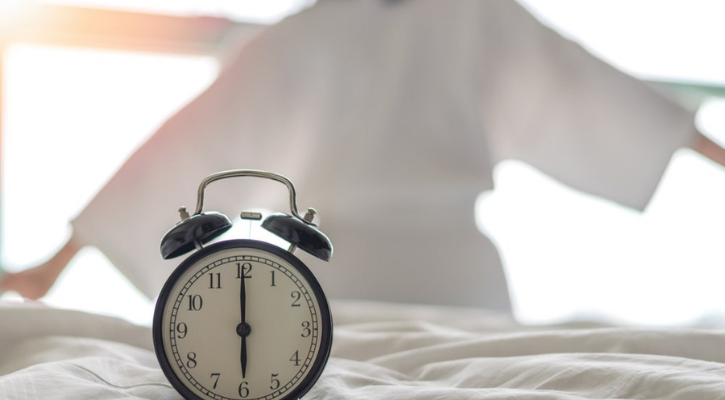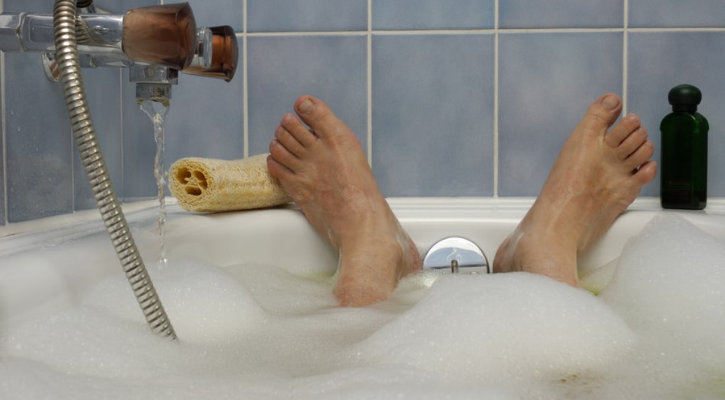Enjoying a warm bath or shower approximately 90 minutes before bed may improve sleep quality, a new study finds.
This may be the result of the natural, quick drop in body temperature that occurs after stepping out of a warm bath or shower and into cooler, room temperature air.
“You sleep better when your internal body temperature is cool,” Caleb Backe, CPT, a health and wellness expert and member of the Mattress Clarity Expert Network, who was unaffiliated with the study, told Mattress Clarity via email. “By augmenting your internal body temperature, the cooling process is sped up. Essentially, this means that you trick your body into cooling down before bed which then improves your overall sleep quality.”
Backe also says it makes sense that 90 minutes might be the optimal time at which to jumpstart this natural cooling process.
“Your body starts to cool down by around 1-degree Fahrenheit approximately 60 to 90 minutes prior to sleep,” Backe told us. “This means that this is the optimal time to use a warm bath or shower to kickstart this process.”
Body Temperature And Sleep
The study, which was conducted by biomedical engineers at the University of Texas at Austin and published in the journal Sleep Medicine Reviews, analyzed more than five thousand studies that found a strong association between bathing or showering in warm or hot water and improvements in sleep quality. All told, 13 of these studies were included in a meta-analysis.
That analysis suggested the ideal time to take a warm bath or shower is one to two hours prior to bedtime, with the most optimal time being approximately 90 minutes before bed. This timing was associated with falling asleep an average of 10 minutes faster.
The study also suggested that the ideal water temperature for improving sleep is between 104 and 109 degrees Fahrenheit. This temperature range was associated with improvements in sleep quality.
These findings align with what researchers know so far about the relationship between body temperature and circadian rhythms.
“Despite common belief, our body temperature is not static throughout the day and actually follows a circadian rhythm that falls in line with our sleep/wake cycles,” Dr. Candice Seti, a licensed clinical psychologist and certified insomnia treatment clinician, who was also unaffiliated with the study, told us. “Our body temperature is lowest in the morning and then climbs throughout the day, peaking around 6 p.m. Then our body temperature slowly starts to drop as we get ready to sleep. It is believed that this temperature drop in the evening signals our body and brain that it is time to sleep.”
Why Taking A Warm Bath Or Shower Might Improve Sleep
Per Backe’s comments above, taking a warm bath or shower before bed might help kickstart the body’s cooling process, which naturally takes place before bed and lays the groundwork for sound sleep.
“Behavior that helps this body temperature drop is suggested to help with sleep,” Seti says. “These behaviors include early evening exercise and earlier evening hot baths or showers. A hot bath or shower causes a rise in body temperature. After the bath or shower, your body then has to compensate and cool itself off. This causes the body temperature to drop, making it easier to fall asleep and stay asleep.”
What’s more, “a warm bath or shower could relax tense muscles, and the more relaxed muscles are, the easier it is for the body to relax and go into the stages of sleep,” Dr. Carolyn Dean, MD, ND, a sleep, diet, and nutrition expert and author of several books including 365 Ways to Boost Your Brain Power: Tips, Exercise, Advice (who was also unaffiliated with the study), told Mattress Clarity via email.
Consistently taking a bath or shower in the hours leading up to bed might also help people develop a regular bedtime routine that paves the way for sleep, says Dr. Sujay Kansagra, Mattress Firm’s sleep health expert and the director of Duke University’s Pediatric Neurology Sleep Medicine Program. “If you are someone who struggles with falling asleep at night, keeping bath time before bedtime can help you develop a routine that signals to [your] body it is time for sleep and relaxation.”
To use this trick most effectively, Seti emphasizes that taking a bath or shower 90 minutes before bedtime may be ideal. “If it is taken too close to bedtime, the body temperature may not drop quickly enough to signal sleep,” she says.
Kansagra concurs. “While you may feel more awake and energized right after the shower, in the subsequent 90 minutes, your body will regulate your sleep/wake cycle (i.e. your circadian rhythm) and prepare itself for bed.”
Featured image: Kryvenok Anastasiia/Shutterstock



